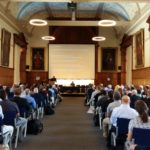Doctoral program in Theology
Doctor in Theology
8 semesters
01/09/2025 - 30/10/2025
March 2026
On-campus
$4.794.000 (annually)
Program Objectives
The principal objective of the PhD in Theology of the Pontificia Universidad Católica de Chile is to conduct scientific research what will result in the elaboration of a doctoral thesis at a high scientific level that constitutes an advance in one of the theological disciplines.
Accreditation
The program was accredited by the CNA-Chile for 6 years until August 2028.
Graduation profile
The graduate will be able to adapt to the scientific community with a good knowledge of the method of scientific research proper to theology, verified through the development of a thesis, which implies mastery of the sources of theology (especially Sacred Scripture and Tradition, with emphasis on classical thought) and a historically solid, hermeneutical and philosophically critical perspective. With these skills, from an identity of his own, the graduate will be able to respond to the challenges of today’s world, understand dogma and evangelization, and communicate his knowledge to the scientific community.
Research Areas
Ver más keyboard_arrow_downSystematic or dogmatic theology:Inside this line. 1. Research on the reception of the Second Vatican Council and on the development of a theology of the signs of the times. 2. Studies on the philosopher and mystic Edith Stein. 3. Research on important theological figures. 4. Research on the theme of ecumenism in Chile and Latin America. |
Patristic theology:It has transformed the Faculty into a Latin American reference in this subject, due to its Patristic Seminars and its Magister in Theology with mention in Patristic Theology. This line of research has as its primary object of study the Christian texts of the first centuries. |
Fundamental theology:It emphasizes interdisciplinary dialogue and contemporary theological issues. It is worth mentioning research on faith and cultures, contextual theologies, popular religion, theology and art, theology and literature, theology of religions, etc. |
Application Requirements
Ver más keyboard_arrow_down
|
Graduation Requirements
Ver más keyboard_arrow_downThe following requirements to obtain the Doctor Academic Degree in Theology are:
In addition of the academic requirements previously said, at the moment to obtain the doctor in theology degree, the student may not be registered as a debtor of any kind with the University. |
Unidades académicas

Faculty of Theology
